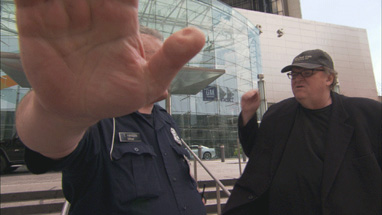Hollywood Psych: Michael Moore and Capitalism: A Love Story
By Sean Collier
September 21, 2009
As the 26th AFL-CIO Convention began last Monday in Pittsburgh, PA, a small group of attendees was scrambling. On a whim, they had invited Michael Moore to not only appear at a rally on the first evening of the convention, but to host a screening of his new film, Capitalism: A Love Story. The event was Monday; the groups – the California Nurses Association and the National Nurses Organizing Committee – had made their invitation only four days prior. When they made this request, they were unaware that Moore's film was yet to receive its American premiere (then scheduled for Tuesday in LA.) It was, frankly, a fairly preposterous request to make on such short notice.
Obviously, Moore said yes.
So, Monday morning, hasty arrangements were being made. Frantic press releases were shot out, a downtown theater was secured, ten hours worth of buzz was spread. Quite suddenly, the most controversial documentarian in the country was en route – now they just had to get people to show up.
Undoubtedly, the modest crowd that filled the Spirit of Pittsburgh ballroom was there to see Moore. They demonstrated this by roundly ignoring the dozen non-famous speakers that appeared before the director, paying substantially more attention to the complimentary dinner and cash bar to one side of the ballroom. Union heads and passionate delegates rallied for single-payer health care at the podium, while about 800 milled about, stood in line for roast beef, and chatted about the Steelers, all while scanning the entrances for the keynote speaker.
Moore's 15-minute speech – in his mind, clearly a prelude to the screening – quickly hit a number of crowd-pleasing notes. Declaring that "The American people are fed up – they've had enough," a theory on which Moore's career rests, he broke down the basic argument of Capitalism: A Love Story: unchecked greed and freedom in the banking industry and on Wall Street, encouraged by the Reagan and Dubya administrations, are creating an unacceptable, dangerous class divide, and threaten the existence of the middle class.
Moore's points were received well (hissing – not booing, but actual hissing – could be plainly heard whenever he uttered the name Reagan,) and he made sure to encourage ("The crazy, impossible things can happen when you least expect them to happen,") while not letting the crowd off the hook ("Our job here is to make our president do the right thing.")
The crowd, quite willing to be worked into a calm frenzy, jumped at the suggestion that they not simply walk over to the theater – why do that when we could march there? Someone produced a banner, a half-dozen TV cameraman began a quick backwards walk, and an impromptu protest march began shambling through the four blocks separating the David L. Lawrence Convention Center and the Byham Theater.
Moore and the conventioneers can, of course, be forgiven for not knowing the social habits of Pittsburghers. See, downtown Pittsburgh itself is densely business-focused, and around 5:00, the place clears out pretty fast in favor of the residential and commercial areas across the rivers. And on a Monday night, most of the city was either out to dinner or comfortably at home by the time the group calmly and politely took to the streets. Someone did alert the police to the unregistered demonstration, but by the time the cops could show up (about six minutes,) the march had arrived at the theater.
Continued:
1
2




